There is no more fertile ground for a creator than space. Not only is there so much possibility in what we KNOW is out there, there is still so much that we don’t. There’s no reason there can’t, for instance, be a race of cat people, or a giant snake made of glass, or cowthulu. With this in mind, Paizo has release Alien Archive 2, a second addition to the weird and wonderful stable of monsters and aliens already populating the Pact Worlds. With over 100 new life-forms in the book (and yes, that includes the three I mentioned), there’s a lot to cover. To help get a feel for it though, I’ve picked my ten favorite new creatures included in the pages of Alien Archive 2. Some are updates of Pathfinder stalwarts, some reference classic science-fiction, and some are just so damn weird I can’t HELP but love them.
Ravai
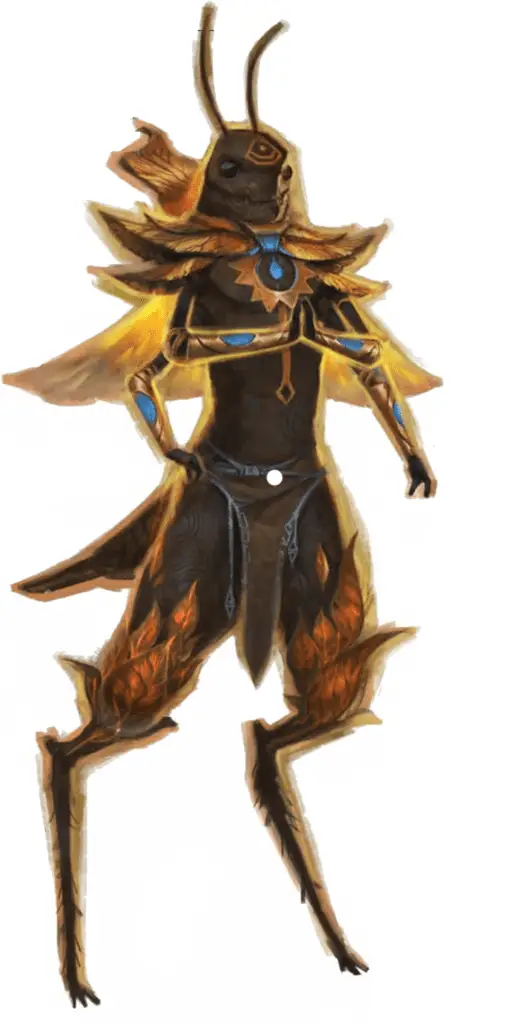
One of the most interesting aspects of Starfinder has been their handling of the fey as they move from the woodlands and fields and into the great beyond. These powerful and capricious creatures are well represented in Alien Archive 2, with new additions like the glitch goblin taking full advantage of the setting. The most interesting addition, however, are the Ravai. Resembling what can best be described as a giant lightning bug, these creatures are caretakers of the stars. And I mean that literally; they are born from a star and live almost entirely for that star and, most importantly, its light. Morally inscrutable to most, Ravai see all life that depends on their star as under their protection. While not deities, their connections with stars give them a great deal of power and can either serve as a high level threat to crews that threaten those in their light or as allies for those who wish to aid their charges.
Dreamer
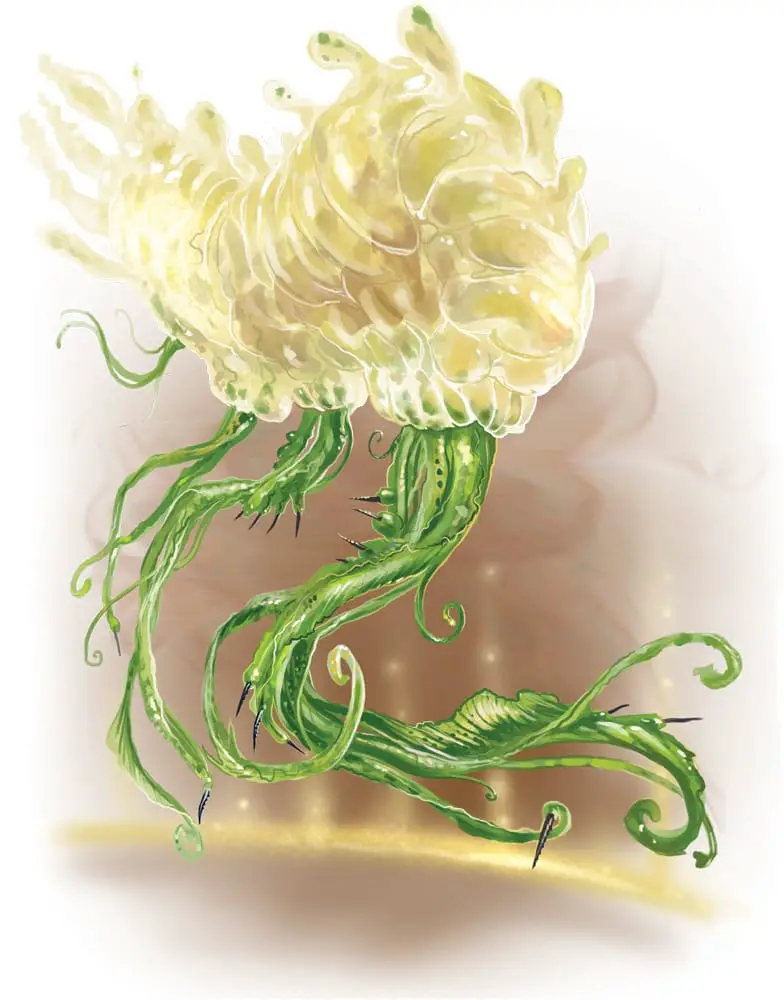
Time, as they say, is an illusion (lunchtime doubly so). No race embodies this more than the Dreamers, an offshoot of the jellyfish-like Barathus. Abandoned long ago within a a seemingly idyllic gas giant called Liavara, the Dreamers lost their sentience even as they gained new and vast psychic powers. Brought back into the fold after millennia, the Dreamers are fiercely protected by the Barathus , and are used by the Pact Worlds as seers (despite questions regarding the accuracy of their prophecies.) They’re also used on the black market to make a psychoactive inhalant called “dreamsnuff,” as well as a weapon mod that causes targets to lose control of their senses. Any sci-fi setting has to have a psychic jellyfish nowadays, and Starfinder’s are certainly a bit different from the norm.
Uplifted Bear
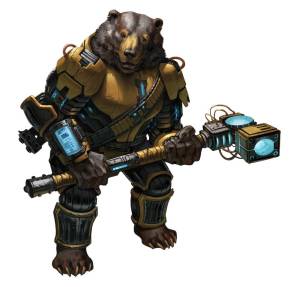
If we can have raccoons, pigs, or Chris Pratt in space, why not bears? No longer the great lumbering beasts that threaten low level adventurers, in Starfinder bears have taken their rightful place among the sentient races of the universe. Thanks to advanced technology and genetic engineering, Uplifted Bears are as intelligent as any human. They serve all sorts of roles, but they’re naturally drawn to scientific pursuits. Oh, and they’re all telepathic. My favorite bit of flavor for the Uplifted Bears is their natural inclination for natural worlds, the arboreal and the green. It’s just a nice idea that even far into the future, wearing armor and holding laser rifles, a bear is bear is a bear. Especially since they now have playable stats, meaning you can make the space-faring Country Bear Jamboree of your dreams.
Quorlu
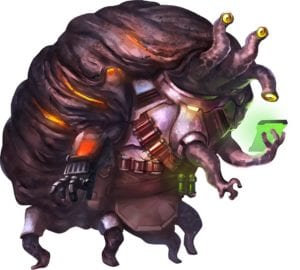
What is science fiction without some of those good good moist boys we call mollusks? Looking like four foot tall snails, the Quorlu are kind of like if Magcargo were a playable race; their brittle crystal shells hide an inside composed of hot plasma. What makes them stand out, however, is the fact that they are essentially space millennials. Unable to maintain a permanent home thanks to the volatile geology of their homeworld, they value community and experiences above material possessions. They prefer to be explorers or diplomats thanks to their abhorrence for war, but in pinch they can be tough fighters with a knack for explosives. They also love to sing. Like the Uplifted Bear, the Quorlu is a fully playable race in Alien Archive 2, but are better suited for more supportive roles on the ship’s crew.
Living Apocalypse
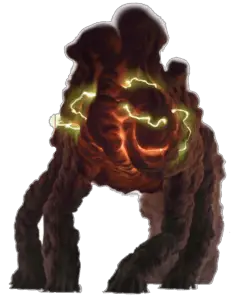
Science-fiction settings have the unique ability to make things bigger and more epic than they are. But when you take Pathfinder, which already has such things as crystal dragons and living mountains, and move it to space…things get a little crazy. Like,say, a 30 foot tall radioactive smoke monster. The Living Apocalypse is the ultimate representation of sci-fi technology run amok. Born from a massive release of destructive energy i.e the use of a doomsday weapon or a planet’s energy grid exploding. Chaotic evil and driven only to destroy, it ravages its surroundings until all life is extinguished. They are usually avoided, but are known to produce crystals that can go for nearly a million credits on the galactic market. The creation of a Living Apocalypse frequently leads to a sort of “gold rush” scour its wake for their chance to strike it rich. Finally, when all of the life around it is extinguished, it goes dormant, waiting for some hapless space explorer or colonist to wake it back up. It’s basically a space age version of the Terrasque and it’s pretty damn cool.
Calecor
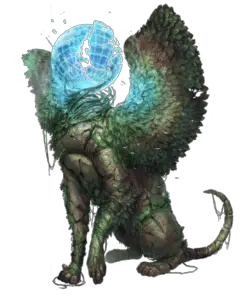 While there is a great deal of destruction and evil among the stars, there is beauty also. The Calecor is in many ways the counterpart and opposite of the Living Apocalypse. They are a fey (that’s right, it’s another space fairy) born from planetary catastrophic, when the millions of souls silenced by war, climate change, or Peter Cushing, rend a hole in the material plane. Born from their anguish, the Calecor is both guardian and healer of the planet that birthed them. They have some neat abilities that reflect their connection with the planet, like a psychic attack that lets them project the planet’s torment into the mind of another. It’s hard to tell if a crew will want to meet a Calecor or not, but I suppose that depends more on the crew than the Calecor.
While there is a great deal of destruction and evil among the stars, there is beauty also. The Calecor is in many ways the counterpart and opposite of the Living Apocalypse. They are a fey (that’s right, it’s another space fairy) born from planetary catastrophic, when the millions of souls silenced by war, climate change, or Peter Cushing, rend a hole in the material plane. Born from their anguish, the Calecor is both guardian and healer of the planet that birthed them. They have some neat abilities that reflect their connection with the planet, like a psychic attack that lets them project the planet’s torment into the mind of another. It’s hard to tell if a crew will want to meet a Calecor or not, but I suppose that depends more on the crew than the Calecor.
Colour Out Of Space
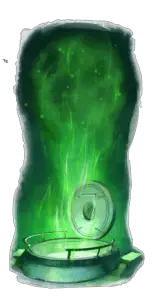
Along with the cruel and enigmatic Mi-Go, the Colour Out Of Space is one of the two homages to H. P. Lovecraft contained within this book coming from his 1927 story of the same name. Like in that tale, the Colour (and yes, you have to include the U or else Howard will manifest in your house physically and call you an old time-y slur) is just what it sounds like: a particularly intelligent and malevolent hue that appears to the naked eye as a constantly shifts through colors that don’t technically exist. It’s undetectable and unable to be communicated with as it travels through space, crash landing on planets to feed on the life that resides there. The things it doesn’t disintegrate are instead horrifically mutated by its very touch, and that includes your player characters. Any that become “colour-blighted” must fix themselves quick before they’re disintegrated by white ash and consumed by the voracious Colour. It’s not something that’s gonna show up in your box of Crayola’s anytime soon, is what I’m saying.
Osharu
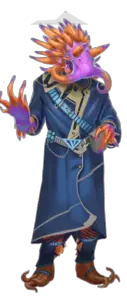
My heart soared when I realized there were not one, but TWO new playable mollusks in Alien Archive 2. Unlike the Quorlu, who only appear like giant snails, the Osharu literally are giant slugs, down to a need to remain hydrated and a weakness to salt. Thanks to their soft and and delicate slug bodies, Osharu are relatively timid. This timidity, as well as their view that science and religion are the same, essentially has turned the Osharu into a race of slightly damp college professors. They have devoted themselves so much to learning that their cities have essentially become big universities. These Space-Berkeley’s have entire districts devoted to one singular scientific field or academic pursuit. Their academic and sluggy nature is reflected in their racial traits, that allow them a vast array of knowledge as well as the ability to secrete slime onto nearby squares.
Emotivore
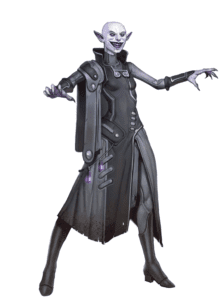
The undead, staples of any fantasy world, were not forgotten when Pathfinder went into the stars. Things like Skeletal Champions (now called Bone Troopers), Zombies (now called Corpsefolk) and Ghouls (which are…still just Ghouls) have moved from the musty tomb to the rusty space hulk, but their core identities remain intact. But, like with the fey, Paizo also added some new twists on the old formulas. Like the Emotivores, who are a race of emotion vampires that bear a strong resemblance to Count Orlok. Born when someone (or more usually, many someones) dies in the middle of intense feeling, Emotivores live only to feed on strong emotions. Not only can they inherently sense emotion, they have a vast array of shape-shifting and mind-altering spells and powers that allow them to manipulate their victims so they will be as delicious a meal as possible. A wily and intelligent foe, the Emotivore also exists as a template for DM’s wishing to create Emotivores that differ slightly from the norm.
Tashtari
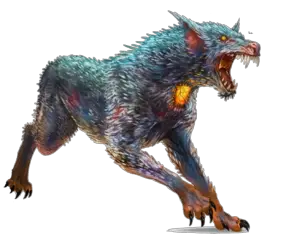 The Tashtari are what happens when a dog gets wrapped in fiber optic cable. What you see in the picture to the left is not fur, but millions of tiny filaments that light up in different ways to help the nocturnal beasts communicate and hunt. How to they hunt, you may ask? Why, with lasers of course! Using the “photogenetic node” node in their throats, the Tashtari spend the day absorbing solar energy, and then at night they expel that energy from their mouth like they’re in viral video from a decade ago. While they serve as a minor threat on their own, “laser wolves” (as they’re called by anybody cool), are also prime hunting for their filaments and special node. If a player so chose, they too could fill their skin with fiber optic light and glow, or put the laser node in their hand to shoot solar beams at people like some sort of bio-tech Tony Stark.
The Tashtari are what happens when a dog gets wrapped in fiber optic cable. What you see in the picture to the left is not fur, but millions of tiny filaments that light up in different ways to help the nocturnal beasts communicate and hunt. How to they hunt, you may ask? Why, with lasers of course! Using the “photogenetic node” node in their throats, the Tashtari spend the day absorbing solar energy, and then at night they expel that energy from their mouth like they’re in viral video from a decade ago. While they serve as a minor threat on their own, “laser wolves” (as they’re called by anybody cool), are also prime hunting for their filaments and special node. If a player so chose, they too could fill their skin with fiber optic light and glow, or put the laser node in their hand to shoot solar beams at people like some sort of bio-tech Tony Stark.
What do you think of the new aliens? Are there any we missed? Anything from Pathfinder you’d like to see given a sci-fi spin? Sound off in the comments! And don’t forget to keep an eye out here for all the latest on Starfinder, Pathfinder, and Paizo!
Starfinder Alien Archive 2 is available now from Paizo.com as well as most game shops, where the hardcover copy retails for $39.99. A PDF copy of the book is also available on the Paizo shop for $9.99 or as part of the Starfinder Roleplaying Game Subscription service.
_________________________________________________________________________________
Big thank you to Paizo for providing the material and images for this article. If you’d like to learn more about Starfinder, Gencon interview you can check out my with its lead designer Robert G McCreary.

